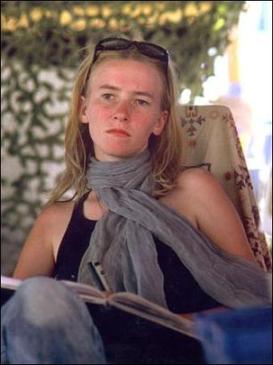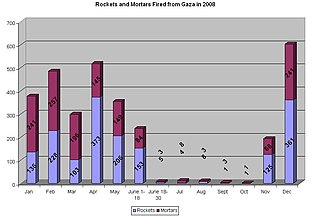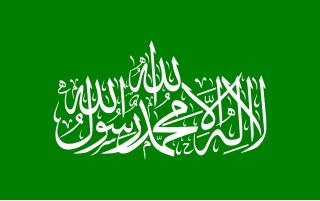
The Gaza Strip, or simply Gaza, is a Palestinian exclave on the eastern coast of the Mediterranean Sea. The smaller of the two Palestinian territories, it borders Egypt on the southwest for 11 km (6.8 mi) and Israel on the east and north along a 51 km (32 mi) border. Together, the Gaza Strip and the West Bank make up the State of Palestine, while being under Israeli military occupation since 1967.

Hamas is a Palestinian Sunni-Islamic fundamentalist, militant, and nationalist organization. It has a social service wing, Dawah, and a military wing, the Izz ad-Din al-Qassam Brigades. It won the 2006 Palestinian legislative election and became the de facto governing authority of the Gaza Strip following the 2007 Battle of Gaza. It also holds a majority in the parliament of the Palestinian National Authority.

The Israeli–Palestinian conflict is one of the world's most enduring conflicts, beginning in the mid-20th century. Various attempts have been made to resolve the conflict as part of the Israeli–Palestinian peace process, alongside other efforts to resolve the broader Arab–Israeli conflict. Public declarations of claims to a Jewish homeland in Palestine, including the First Zionist Congress of 1897 and the Balfour Declaration of 1917, created early tensions in the region after waves of Jewish immigration. Following World War I, the Mandate for Palestine included a binding obligation for the "establishment in Palestine of a national home for the Jewish people". Tensions grew into open sectarian conflict between Jews and Arabs. The 1947 United Nations Partition Plan for Palestine was never implemented and provoked the 1947–1949 Palestine War. The current Israeli-Palestinian status quo began following Israeli military occupation of the West Bank and Gaza in the 1967 Six-Day War, known as the Palestinian territories.
This timeline of the Israeli–Palestinian conflict lists events from 1948 to the present. The Israeli–Palestinian conflict emerged from intercommunal conflict in Mandatory Palestine between Palestinian Jews and Arabs, often described as the background to the Israeli–Palestinian conflict. The conflict in its modern phase evolved since the declaration of the State of Israel on May 14, 1948 and consequent intervention of Arab armies on behalf of the Palestinian Arabs.

The Palestinian territories are the two regions of the former British Mandate for Palestine that have been militarily occupied by Israel since the Six-Day War of 1967, namely: the West Bank and the Gaza Strip. The International Court of Justice (ICJ) has referred to the West Bank, including East Jerusalem, as "the Occupied Palestinian Territory", and this term was used as the legal definition by the ICJ in its advisory opinion of July 2004. The term occupied Palestinian territory was used by the United Nations and other international organizations between October 1999 and December 2012 to refer to areas controlled by the Palestinian National Authority, but from 2012, when Palestine was admitted as one of its non-member observer states, the United Nations started using exclusively the name State of Palestine. The European Union (EU) also adopts the term occupied Palestinian territory, with a parallel term Palestinian Authority territories also occasionally used. The government of Israel and its supporters use the label "disputed territories" instead.

Rachel Aliene Corrie was an American activist and diarist. A member of the pro-Palestinian group International Solidarity Movement (ISM), she was crushed to death by an armored bulldozer of the Israel Defense Forces in a southern Gaza Strip combat zone during the height of the Second Intifada under contested circumstances.

Surf movies fall into three distinct genres:
Aaron Klein is an American-Israeli conservative political commentator, journalist, strategist, bestselling author, and senior advisor to Prime Minister Benjamin Netanyahu. He served as campaign manager for Netanyahu's election campaign for the March 2021 election and as chief strategist for Netanyahu's 2020 election campaign that resulted in a rotating unity government with Netanyahu at the helm and his 2022 campaign in which Netanyahu won a full-term. Klein was Netanyahu's full-time strategic advisor in government from 2020 to 2021, during the period Netanyahu was prime minister of Israel's 36th government.

The Arab–Israeli conflict is an ongoing intercommunal phenomenon involving political tension, military conflicts, and other disputes between various Arab countries and Israel, which escalated during the 20th century, but had mostly faded out by the early 21st century. The roots of the Arab–Israeli conflict have been attributed to the support by Arab League member countries for the Palestinians, a fellow League member, in the ongoing Israeli–Palestinian conflict; this in turn has been attributed to the simultaneous rise of Zionism and Arab nationalism towards the end of the 19th century, though the two national movements had not clashed until the 1920s.

The Gaza–Israel conflict is a part of the localized Israeli–Palestinian conflict, but is also a scene of power struggle between regional powers including Egypt, Iran and Turkey together with Qatar, supporting different sides of the conflict in light of the regional standoff between Iran and Saudi Arabia on one hand and between Qatar and Saudi Arabia on the other, as well as crisis in Egyptian-Turkish relations.
Dorian "Doc" Paskowitz was an American surfer and physician, who gave up practicing medicine for a living and decided to become a professional surfer. In 1972, he founded a surf camp run by his family, where campers could live alongside and surf with members of the Paskowitz family. He and his family have been referred to as the "First Family of Surfing".

Lesbian, gay, bisexual, & transgender (LGBT) people in Palestine face a precarious situation due to a lack of civil rights legislation aimed at tackling discrimination. There is also a significant legal divide between the West Bank and the Gaza Strip. In the West Bank, same-sex acts were decriminalized in the adoption of the Jordanian Penal Code of 1951 following the Jordanian annexation. Gaza, however, still follows the British Mandate Criminal Code Ordinance, No. 74 of 1936, which outlaws same-sex acts between men, with the current punishment being up to 10 years in prison.

The Free Gaza Movement (FGM) is a coalition of human rights activists and pro-Palestinian groups formed to break Israel's blockade of the Gaza Strip and publicise the situation of the Palestinians there. FGM has challenged the Israeli–Egyptian blockade by sailing humanitarian aid ships to Gaza. The group has more than 70 endorsers, including Desmond Tutu and Noam Chomsky.

The blockade of the Gaza Strip is the ongoing land, air, and sea blockade of the Gaza Strip imposed by Israel and Egypt temporarily in 2005–2006 and permanently from 2007 onwards, following the Israeli disengagement from Gaza.

The Gaza War, also known as Operation Cast Lead, also known in the Muslim world as the Gaza Massacre, and referred to as the Battle of al-Furqan by Hamas, was a three-week armed conflict between Gaza Strip Palestinian paramilitary groups and the Israel Defense Forces (IDF) that began on 27 December 2008 and ended on 18 January 2009 with a unilateral ceasefire. The conflict resulted in between 1,166 and 1,417 Palestinian and 13 Israeli deaths.

The 2008 Israel–Hamas ceasefire was an Egyptian-brokered six-month Tahdia "for the Gaza area", which went into effect between Hamas and Israel on 19 June 2008. According to the Egyptian-brokered agreement, Israel promised to stop air strikes and other attacks, while in return, there would not be rocket attacks on Israel from Gaza. Once the ceasefire held, Israel was to gradually begin to ease its blockade of Gaza.

Since 2001, Palestinian militants have launched thousands of rocket and mortar attacks on Israel from the Gaza Strip as part of the continuing Arab–Israeli conflict. The attacks, widely condemned for targeting civilians, have been described as terrorism by the United Nations, the European Union, and Israeli officials, and are defined as war crimes by human rights groups Amnesty International and Human Rights Watch. The international community considers indiscriminate attacks on civilian targets to be illegal under international law.

Islamism in the Gaza Strip involves efforts to promote and impose Islamic laws and traditions in the Gaza Strip. The influence of Islamic groups in the Gaza Strip has grown since the 1980s. Following Hamas' victory in the 2006 Palestinian elections and a conflict with supporters of the rival Fatah party, Hamas took complete control of the Gaza Strip, and declared the "end of secularism and heresy in the Gaza Strip". For the first time since the Sudanese coup of 1989 that brought Omar al-Bashir to power, a Muslim Brotherhood group ruled a significant geographic territory. Gaza human-rights groups accuse Hamas of restricting many freedoms in the course of these attempts.
B'Tselem is a Jerusalem-based non-profit organization whose stated goals are to document human rights violations in the Israeli-occupied Palestinian territories, combat any denial of the existence of such violations, and help to create a human rights culture in Israel. It is currently headed by Hagai El-Ad, who has served as its director-general since May 2014. B'Tselem also maintains a presence in Washington, D.C., where it is known as B'Tselem USA. The organization has provoked sharp reactions within Israel, ranging from harsh criticism to strong praise.

Gaza Surf Club is a 2016 German documentary film directed by Philip Gnadt and Mickey Yamine. The film takes a "day in the life" approach and follows the story of a group of Gazans who practice surfing as a source of freedom in the Mediterranean Gaza Strip coast. Also, the journey of the young Ibrahim, one of the surfers who travels to Hawaii looking for opportunities to create a surfing club in the Gaza Strip.














